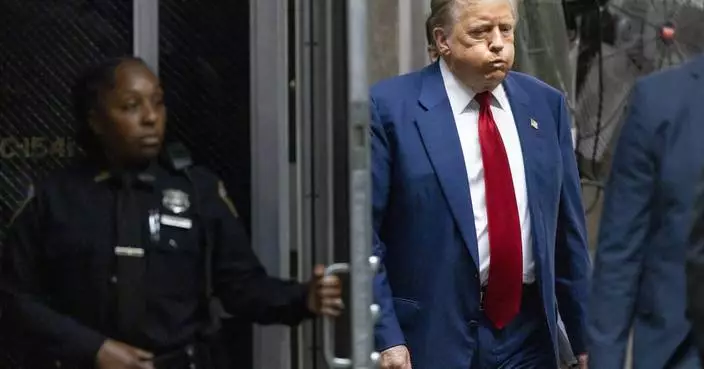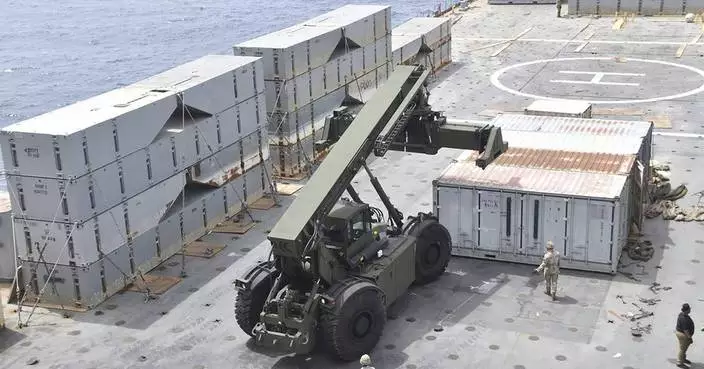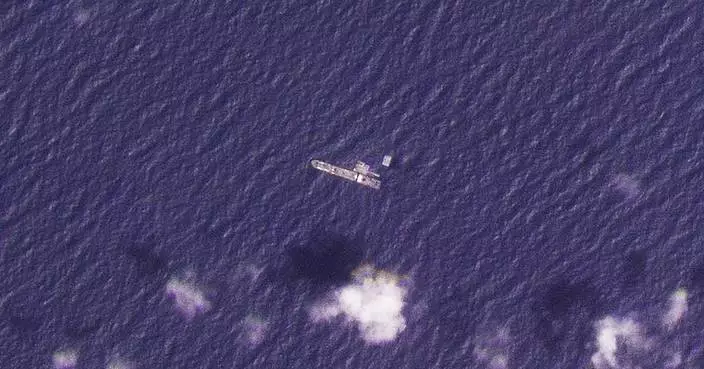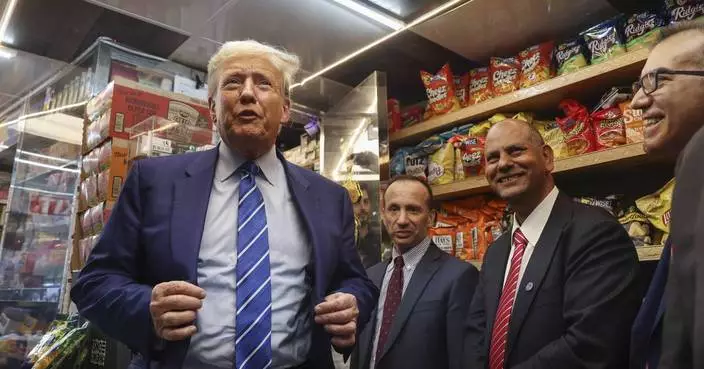Disputes over President Donald Trump's border wall and California's bullet train are intensifying the feud between the White House and the nation's most populous state.
The Trump administration on Tuesday said it plans to cancel or claw back $3.5 billion in federal dollars allocated to California's high-speed rail project, a move Gov. Gavin Newsom called "political retribution" for the state's lawsuit against Trump's declaration of a national emergency. California led a 16-state coalition in filing the suit Monday, challenging Trump's power to declare an emergency to earn more money to build a wall along the U.S.-Mexico border.
"It's no coincidence that the Administration's threat comes 24 hours after California led 16 states in challenging the President's farcical 'national emergency,'" Newsom said in a statement. "This is clear political retribution by President Trump, and we won't sit idly by."
It's the latest spat between Trump and California, which has styled itself as the Democratic-led "resistance" to the administration. Newsom, less than two months into his tenure, has appeared more eager to hit back at Trump than former California Gov. Jerry Brown. The lawsuit is California's 46th against the Trump administration.
Using a broad interpretation of his executive powers, Trump declared an emergency last week to obtain wall funding beyond the $1.4 billion Congress approved for border security. The move allows the president to bypass Congress to use money from the Pentagon and other budgets.
Trump's use of the emergency declaration has drawn bipartisan criticism and faces a number of legal challenges.
Still the president has told reporters he expects to prevail.
"I think in the end we're going to be very successful with the lawsuit," Trump told reporters, calling it an "open and closed" case.
Trump had earlier singled out California for its lead role in the suit, seeking to link the state's high-speed rail project to his plan for the wall.
On Twitter, Trump claimed the "failed Fast Train project" was beset by "world record setting" cost overruns and had become "hundreds of times more expensive than the desperately needed Wall!"
The estimated cost for a San Francisco-to-Los Angeles train has more than doubled to $77 billion. That's about 13 times the $5.7 billion Trump sought unsuccessfully from Congress to build the wall.
Hours later, the U.S. Department of Transportation told California it planned to cancel nearly $1 billion in federal money allocated to the rail project and wanted the state to return $2.5 billion it had already spent.
Trump's comments about a "failed" project followed Newsom's comments last week that the current plan for an LA-San Francisco train would cost too much and take too long. Instead, he said he'd focus immediately on a line through the Central Valley while still doing environmental work on the full line. That work is a requirement for keeping the federal money.
Still, the U.S. Department of Transportation said Newsom's remarks reinforced concerns about the project's ability to deliver. The department wrote Newsom's comments mark a "significant retreat from the State's initial vision and commitment and frustrated the purpose for which the Federal funding was awarded."
California Republicans who have long called the project a waste of money applauded the Trump administration's move to take back the money.
"It is time to move on from the broken high-speed rail project and redirect our efforts to infrastructure projects that work for Californians," said U.S. House Minority Leader Kevin McCarthy of Bakersfield, a city on the train's route.
But Newsom said the state intends to keep the money. Losing it would be a major blow to the chronically underfunded project.
"This is California's money, and we are going to fight for it," he said.
The agreement with the federal government allows the administration to withhold or take back the money if the state fails to make "adequate progress" or "complete the project or one of its tasks."
If the federal government decides to take the money back, it doesn't have to wait for California to write a check. Instead it could withhold money from other transportation projects.
Tuesday's comments won't be the last; the administration has given California until March 5 to formally respond.
Associated Press writer Catherine Lucey in Washington contributed.
WASHINGTON (AP) — The United States on Wednesday imposed new sanctions on hundreds of companies and people tied to Russia's weapons development program, more than a dozen Chinese entities accused of helping Moscow find workarounds to earlier penalties, and individuals linked to the death of Kremlin opposition leader Alexei Navalny.
The actions by the departments of Treasury and State target Russia’s military-industrial base, chemical weapons programs and people and companies in third countries that help Russia acquire weapons components as its invasion of Ukraine has entered its third year.
Treasury Secretary Janet Yellen said the action “will further disrupt and degrade Russia’s war efforts by going after its military industrial base and the evasion networks that help supply it.”
The Senate, meanwhile, gave final approval to legislation barring imports of Russian uranium, boosting U.S. efforts to disrupt Russia’s war in Ukraine. Democratic President Joe Biden is expected to sign the bill into law.
About 12% of the uranium used to produce electricity at U.S. nuclear power plants is imported from Russia, according to the U.S. Energy Information Administration.
A spokesperson for the National Security Council said Wednesday that Biden shares lawmakers’ concerns about U.S. reliance on Russia for low-enriched uranium to support its domestic nuclear fleet.
Included in the administration's announcement are importers of cotton cellulose and nitrocellulose, which are used to produce gunpowder, rocket propellants and other explosives. The penalties also target Russian government entities and people tied to Russia's chemical and biological weapons programs, companies related to Russia's natural gas construction projects and three workers at the penal colony where Navalny died.
Russian President Vladimir Putin has railed against earlier rounds of U.S. and Western penalties, claiming they are “illegitimate sanctions” on his country.
A group of 16 targets in China and Hong Kong, most of which are related to Russian procurement workarounds, are named by the Biden administration.
Yellen traveled to Guangzhou and Beijing last month to warn Chinese officials that they “must not provide material support for Russia’s war and that they will face significant consequences if they do."
China has said it is not providing Russia with arms or military assistance, although Beijing has maintained robust economic connections with Moscow, alongside India and other countries, as the West imposes sanctions.
Companies in China, Azerbaijan, Belgium, Slovakia, Turkey and the United Arab Emirates were accused of helping Russia acquire technology and equipment from abroad. The penalties aim to block them from using the U.S. financial system and bar American citizens from dealing with them.
Biden last week said he would immediately rush badly needed weaponry to Ukraine as he signed into law a $95 billion war aid measure that also included assistance for Israel, Taiwan and other global hot spots.
The upcoming uranium ban is also expected to impact Russian revenues by at least $1 billion. The U.S. banned Russian oil imports after Russia invaded Ukraine in early 2022 but did not against uranium, despite frequent calls to do so by U.S. lawmakers in both parties.
Wyoming Sen. John Barrasso, the top Republican on the Senate Energy and Natural Resources Committee, called the import ban “a tremendous victory” and said it “will help defund Russia’s war machine, revive American uranium production and jumpstart investments in America’s nuclear fuel supply chain.″
“Wyoming has the uranium to replace Russian imports, and we’re ready to use it,″ Barrasso added.
West Virginia Sen. Joe Manchin, a Democrat who heads that Senate committee, said it was "unconscionable” for the U.S. to help make it possible for Putin to “finance his unlawful war against Ukraine” through U.S. reliance on Russian uranium.
Besides the import ban, the legislation frees up $2.7 billion in previously authorized funding to ramp up domestic uranium production.

FILE- This June 6, 2019, file photo shows the U.S. Treasury Department building at dusk in Washington. The United States has imposed new sanctions on hundreds of firms and people tied to Russia’s weapons development program, more than a dozen Chinese firms accused of helping Russia find workarounds to sanctions and individuals tied to the death of Russian dissident Alexey Navalny. The sanctions imposed Wednesday by the Treasury and State departments target Russia’s military-industrial base, chemical weapons programs and people and firms in third countries that help Russia acquire weapons components as its invasion of Ukraine has entered its third year. (AP Photo/Patrick Semansky, File)










